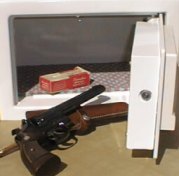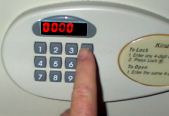
Posted on 11/09/2003 2:42:30 PM PST by Washingtonian
Bound to Misfire
By John R. Lott, Jr.
This week President Bush's program, Project Childsafe, begins distributing 20 million gun locks. Over 712,000 locks will be given out just in New York. It seems like such a reasonable program, who could oppose it? After all, if a gun lock can save a life, it seems a small cost. Unfortunately, despite the obvious feel-good appeal of these rules, gun locks and safe storage laws are more likely to cost lives than to save them.
Many have seen the public service ads put out by the Clinton Justice Department showing the voices or pictures of children between the ages of four and eight, implying that there is an epidemic of accidental deaths of these young children. The ads create the impression that the archetype case involves naturally curious children shooting themselves or other children.
Take the discussion in one of the ads from 2000: "My brother Omar was eight years old when he died. He had a hole in his tummy. A bullet hit him. The gun came from the garage. I was just playing. I didn't mean to shoot daddy's gun."
Accidental gun deaths tragically claim children's lives, though fortunately they are much rarer than most people might think. During 2000 there were 37 accidental gun deaths for children under 10 in the U.S., In 1999 there were 31, and only six of these cases actually involved a child firing the gun. Indeed from 1995 to 1999 the entireUnited States saw only between five and nine cases a year where a child under ten either accidentally shot themselves or another child.
Obviously we want to avoid any deaths where possible, but some perspective is useful. With over 90 million adults owning a gun and almost 40 million children under 10, it is hard to think of almost any other potentially dangerous products kept in American homes that have as few accidental deaths associated with them. Over 1,260 children under ten died in cars in 1999. Another 370 died as pedestrians hit by cars. Accidents involving residential fires took 484 children's lives. Even 92 children under the age of five drowned accidentally in bathtubs.
The overwhelming majority of gun owners must be extremely careful or such gun accidents would be much more frequent.
Those who accidentally fire a gun are not typical people. Shooters are overwhelmingly adults who have problems with alcoholism and long criminal histories, particularly arrests for violent acts. They are also disproportionately involved in automobile crashes and are much more likely to have had their driver's license suspended or revoked. Even if these individuals were to use a lock, locks are not designed to stop adult males from firing their own gun.
Gun locks have their own problems. Most importantly, the increased time it takes to get the gun ready to deter a criminal. Locked guns are not as readily accessible for defensive gun uses. If criminals are deterred from attacking victims because they fear people might defend themselves, gun locks may therefore increase crime. Exacerbating this problem, many mechanical locks (such as barrel or trigger locks) also require that the gun be stored unloaded. Loading a gun obviously requires yet more time to respond to a criminal.
Guns clearly deter criminals, with Americans using guns defensively over 2 million times each year -- 4.5 times more frequently than the 500,000 times guns were used to commit crimes in 2001. Over 90 percent of the time simply brandishing the weapon stops an attack. Even though the police are extremely important at reducing crime, they simply can't be there all the time and virtually always end up at the crime scene after the crime has been committed.
Even if one has young children, it does not make sense to lock up a gun if one lives in a high crime urban area. Exaggerating the risks involved in gun ownership will make people lock up their guns or cause them not to own a gun in the first place and will result in more deaths, not fewer deaths.
Recent research that I have done in my book, The Bias Against Guns, examined juvenile accidental gun deaths and suicides for all the states in the United States from 1977 to 1998, found that safe storage laws had no impact on either type of death. However, what did happen was that law-abiding citizens were less able to defend themselves against crime. The sixteen states that adopted these laws during this period faced over 300 more murders and 4,000 more rapes per year. Burglaries also increased dramatically.
No one is exempt from criticism, whether Bush, Clinton, or the media. Unfortunately, bad advice, no matter how well intentioned, can have tragic consequences and cost lives.
Lott, a resident scholar at the American Enterprise Institute, is the author of the book The Bias Against Guns (Regnery, 2003).

There's the problem. Hollywood teachd kids, by proxy, is that the first thing you do when you find a gun is to point it at someone and pull the triger. BANG BANG YOUR DEAD!
Never, and I mean NEVER has there been on shred of "Safe Gun Handling" by example, in any movie I have ever seen.
 <
<
Use a code-only safe that opens with a digital code as opposed to a safe that can be opened with a key.

Key safes are only as secure as your set of keys and key access is much slower. A simple entering of 4 numbers on a keypad and the safe opens quickly.
Not as fast as having the gun loaded and at the ready at the bedside but the quickest access you can get to your loaded firearm and still have it locked up.
Naturally, there will need to be random inspections, to ensure compliance.
It's for the children.
From what I hear, Canadians already have to keep their guns in a place as you have described. I can see it happening in a state like California within ten years. Guys like the below pictured clown will help it happen.


Disclaimer: Opinions posted on Free Republic are those of the individual posters and do not necessarily represent the opinion of Free Republic or its management. All materials posted herein are protected by copyright law and the exemption for fair use of copyrighted works.